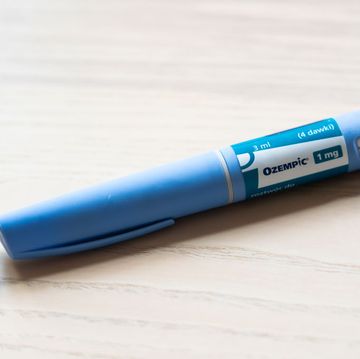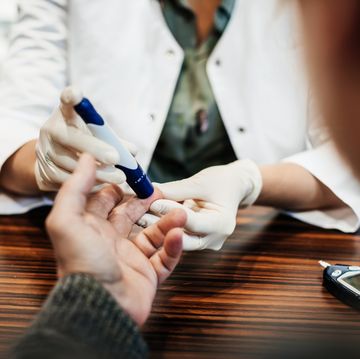- Ninety-six million Americans have prediabetes.
- Research has found taking vitamin D may lower the risk that people with prediabetes will develop diabetes.
- Experts say vitamin D alone is unlikely to prevent diabetes.
While many people have never heard of prediabetes before, the condition impacts a whopping 96 million Americans. Prediabetes is a condition in which blood sugars are higher than normal, but not high enough to be classified as type 2 diabetes, per the Centers for Disease Control and Prevention (CDC). But, it is still serious and can lead to type 2 diabetes.
Now, a new study published in the Annals of Internal Medicine suggests that taking a vitamin D supplement can help prevent people with prediabetes from developing type 2 diabetes. For the study, researchers analyzed three clinical trials that studied the impact of vitamin D supplementation on type 2 diabetes risk. The researchers found that, during a three-year follow-up, 22.7% of participants who took vitamin D developed type 2 diabetes, while 25% of those who took a placebo ended up progressing to the type of diabetes.
While that doesn’t sound like a huge difference, the researchers then applied those numbers to the 374 million adults across the world with prediabetes and determined that taking the supplement may delay the development of diabetes in more than 10 million people. Their conclusion was simple: “In adults with prediabetes, vitamin D was effective in decreasing the risk for diabetes.”
This isn’t the first time vitamin D has been linked to a reduced risk of developing diabetes. But why might the supplement lower your risk and who should try this? Experts break it down.
First, a quick primer on vitamin D
Vitamin D, a.k.a. calciferol, is a fat-soluble vitamin, according to the National Institutes of Health (NIH). It helps promote the absorption of calcium in your gut—without vitamin D, bones can become thin and brittle. Vitamin D can also reduce inflammation and helps modulate cell growth, immune function, and glucose metabolism, the NIH says.
Vitamin D is naturally present in some foods, like the flesh of fatty fish, mushrooms, and fortified milk and cereal, but it’s also produced by the body when your skin is exposed to UV rays, the NIH explains.
Why might vitamin D lower the risk of developing prediabetes?
This isn’t a new thing. “It’s pretty well established that there does seem to be a connection between vitamin D status and diabetes risk,” says Jessica Cording, R.D., author of The Little Book of Game Changers. The exact reason why this link exists isn’t entirely clear, Cording says, but there are some theories.
One is that vitamin D impacts glycemic control, which is trying to keep your blood sugar levels under a certain number, she says. Vitamin D is also something called a “prohormone,” which is a substance that the body converts into a hormone, she points out. “Hormones are tied to endocrine function and diabetes, and having healthy levels of the prohormone vitamin D can help regulate other hormones in the body, promoting efficient function of normal body processes,” Cording says.
Research has also linked vitamin D to a lower risk of insulin resistance, which is when the body is unable to respond to or use insulin. Insulin, in case you’re not familiar, is a hormone that helps bring glucose (sugar) to your cells, where it’s used for energy. Insulin resistance can lead to prediabetes and type 2 diabetes, according to the Cleveland Clinic. One study found that the risk of developing insulin resistance went down in people who took vitamin D, with the researchers theorizing that the supplement helps lower the risk due to vitamin D’s ability to lower inflammation in the body. (Inflammation raises the risk of insulin resistance.)
Sylvia Christakos, Ph.D., a vitamin D expert and professor at Rutgers New Jersey Medical School, agrees that the way in which vitamin D supplementation may help lower type 2 diabetes risk is “not well defined,” she points out that people with low levels of 25-hydroxyvitamin D (a metabolite of vitamin D that’s measured to determine vitamin D deficiency or sufficiency) are more likely to have impaired function of the pancreas’ beta cells (which make insulin) and insulin resistance.
Unfortunately, many people have suboptimal levels of vitamin D. Research shows that 93% of Americans don’t get even 400 IU of vitamin D a day—and the recommendation for most healthy adults is 600 IU a day. But it’s difficult to know for sure if you have low levels of vitamin D, says Rose Lin, M.D., an endocrinologist at Providence Saint John’s Health Center in Santa Monica, Calif. “Vitamin D deficiency is typically asymptomatic and signs are few,” she says. “Laboratory testing is usually needed.”
It’s important to note that the latest study had people take high levels of vitamin D—4,000 IU a day, which is significantly higher than the recommended 600 IU. However, Dr. Christakos says this is “safe” and the “upper limit” of what a person can safely take.
Worth noting: Dr. Lin warns that taking too much vitamin D can lead to vitamin D toxicity, which causes too much calcium to be absorbed by your body. “High calcium levels can cause problems such as kidney stones and constipation,” she says.
How to lower your risk of type 2 diabetes when you have prediabetes
Experts stress that taking vitamin D alone—if, in fact your doctor recommends that you go that route—is unlikely to keep prediabetes from progressing to type 2 diabetes. “It’s a good step to take, but there’s no data that shows that vitamin D alone will prevent diabetes,” Cording says.
Dr. Christakos agrees. “Vitamin D can supplement, but cannot replace the greater benefit of exercise and diet modification,” she says. That’s why it’s important to adopt a slew of lifestyle changes to lower your risk of progressing to type 2 diabetes. According to the CDC, those can include:
- Consult your doctor about losing a small amount of weight. The CDC specifically recommends “modest” weight loss, which means losing 5% to 7% of your body weight. But it’s important to discuss this with your doctor.
- Exercise regularly. Strive to get at least 150 minutes a week of moderate-intensity activity, like brisk walking.
- Manage your stress. Stress can raise your risk of insulin resistance, Cording points out.
Cording also recommends that you aim to get a “good balance of protein, fat, and carbs” in your meals, limit added sugars, eat plenty of fiber, and try to get at least seven hours of sleep a night.
“If you’re feeling really overwhelmed or confused about your diabetes risk, reach out to an endocrinologist [and] consider working with a registered dietitian,” Cording says. “They should be able to help you come up with a realistic plan.”














